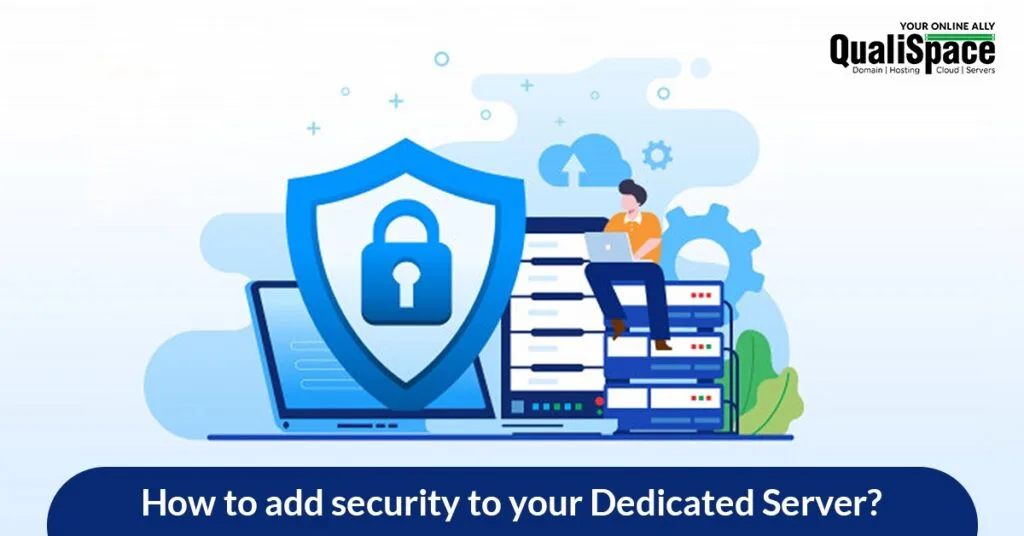
How to add security to your dedicated server
Dedicated servers are ideal for running heavy workloads. To know how to add more security to your dedicated server, here are some tips from QualiSpace…
The primary characteristic of a dedicated server is the absence of noisy neighbors. Your resources are not shared among your peers. This counts as the major reason why the dedicated servers are more secure than shared hosting. Then why do we need to know how to add security to your dedicated server?
Well, having said that, designing an extra layer of security doesn’t sound bad. If you have a QualiSpace dedicated server, you are already better off in terms of safety.
Still, if you want to add more security from your side, here are a few points that will help you.
1. Frequent up-gradation of the system
As you access the server from your system, you will have to check for the manual updates and security patches on your system. Whether you are using a Linux OS or Windows OS, make sure that the applications you are using are up-to-date. Often the vendor companies float upgrades to their applications after bridging the security gaps. Sometimes, your applications may not raise a notification about the available upgrade. So, you will have to be proactive and check for the upgrade by yourself. Upgraded applications contain improved security measures that otherwise could be breached by hackers. Therefore, you should keep your system up-to-date for maximum security.
2. Use trusted networks from trusted ISPs
Your QualiSpace dedicated servers are already protected by trusted networks at the data center. However, when you are accessing the dedicated server through your local system, the network you are using should be trusted. There are many public wireless networks and public Wi-Fi available. So, what’s a risk in using free Wi-Fi? Well, there are many!
- Man-in-the-Middle attack
- Malware induction
- Unencrypted transition
- Eavesdropping
- Snooping
- Sniffing, etc.
Only use trusted networks that transfer data transparently. Also, if other users have access to your dedicated server, make sure they also know this protocol. Untrusted networks may not forbid third-party access to your data. Whereas trusted networks have their built-in firewalls to protect the data.
3. DDoS Protection
DDoS or Distributed Denial-of-Service is a surprisingly common cyber-attack. In a DDoS attack, the attacker tries to make the victim system unavailable to users. Typical DDoS attacks are:
- SYN flooding
- UDP flooding
- HTTP flooding
- Ping of Death attack
- Smurfing
If your system gets attacked, your customers/users will not be able to access the system for some time. Therefore, you must provide DDoS protection to your dedicated server. If you are using QualiSpace Dedicated Server, you will not face any problem as there will be DDoS protection by default. But, if your server is hosted with some other provider then, you will have to make a provision for DDoS protection to your dedicated server.
4. Adopt a well-scheduled Back-up plan
As the classic saying goes, prevention is always better than cure! If in the worst case, your data is lost then you should have a backup to continue. There are many factors due to which the data can be lost. Examples, hardware failure, IT disaster, human errors, attacks, thefts, viruses, Trojan Horses, etc. In the case of sensitive applications such as banking and finances, hospitals, criminal records, etc. loss of data can become fatal. Data Backup is an activity of creating replicas of the data as per a scheduled policy. It can be a local backup or at a remote location.
5. Disaster Recovery and Business Continuity
‘Disaster Recovery Planning’ is the state of being prepared for the unthinkable. No matter what you do, risk cannot be eliminated. Therefore, it is important to have a plan B ready, that can take over and keep your business going. This is called Business Continuity. An IT disaster like fires or flooding in the data center should not wreck your system. A Disaster Recovery plan generally includes business impact analysis (BIA) and risk analysis (RA). This estimates the Recovery Time Objective (RTO) and Recovery Point Objective (RPO).
6. Managed Services for a hosted dedicated server
Optimizing the server utilization while also keeping it secure from the threats and attacks is a herculean task. This is the point where you should genuinely consider managed services. Managed Service Providers manage the servers for you. All you have to do is work in the ready environment while MSPs take care of the peripherals.
7. Miscellaneous
Considering the prime security measures that you can take for your dedicated server, here are some additional tips to strengthen the fence.
These were our tips to add a layer of protection from the client-side. If you want any help, remember we are just a phone call away!
- Be assured of the protection from SQL Injection if you are hosting a database.
- Implement a rigorous password policy at your end.
- Change the credentials for ‘root’/’admin’ access.
- If you want to share the system with your employees, create different users with limited access rights to root/admin.
- Configure the firewalls at your end to protect the client systems and internal network.
- Change the port number (default: 22) of SSH listening port to prevent it from hacking bots which sense the default port first.
- Strong protection policy against Brute-Force Attacks.
- Use trustworthy and licensed software. Pirated copies of the software can corrupt your entire system through malware injection.
- Make sure that the interfaces for server administration are TLS (Transport Layer Security) protected example, protocols like SMTP, IMAP, POP3 have TLS-protected access.


